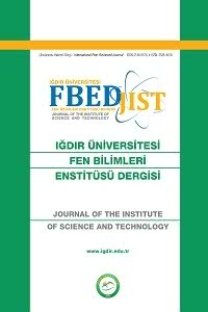Context based learning' effects on achievement and scientifc process skills in biology teaching
Biyoloji öğretiminde başarı ve bilimsel süreç becerilerine yaşam temelli öğrenmenin etkileri
___
- Bennett, J., 2003. Teaching and Learning Science, New York USA, Continuum publishes.
- Bennett, J., Holman, J., 2003. Context-based approaches to the teaching of chemistry: what are they and what are their effects? Chemical Education: Towards Research-Based Practice, Eds: Gilbert, J.K., Jong De O., Justi, R., Treagust, D., F., Van Driel, J., H., Kluwer Academıc Publıshers, New York, Boston, Dordrecht, London, Moscow, 165-185.
- Bennett, J., Campbell, B., Hogarth, S., Lubben, F. 2005. A systemat- ic review of the effects of context-based and STS approaches in science teaching. In C. Kasanda, L. Muhammed, S. Akpo and E. Ngololo (Eds): Proceedings of the 13th Annual Con- ference of the Southern African Association for Research in Mathematics, Science and Technology Education, Windhoak, Namibia. Pp. 53-58.
- Bennett, J., Lubben, F. 2006. Context based chemistry: the salters approach. International Journal of Science Education, 28 (9), 999-1015.
- Chiu, C., H., 2002. The effects of collaborative teamwork on sec- ondary science Journal of Computer Assisted Learning 18, 262-271.
- Doğruöz, P., 1998. Effect of Science Process Skill Oriented Lesson on Understanding of Fluid Force Concepts, Master Thesis, The Middle East Technical University, Ankara.
- Dong, Z.Y., 2005. Improving learning in undergraduate control engineering courses using context-based learning models. Internatıonal Journal of Engıneerıng Educatıon 21 (6), 10761082
- Gilbert, J. K. 2006. Context based chemistry education on the nature of context in chemical education. International Journal of Science Education, 28 (9), 957-976.
- GutWill-Wise, J., P., 2001. The impact of active and context based learning in introductory chemistry courses: an early evaluation of the modular approach. Journal of Chemical Education, 78 (5), 684690
- Harlen, W. 2000. Teaching, Learning & Assessing Science 5-12. Paula Chapman Publishing Ltd.
- Holman, J., Pilling, G., 2004. Thermodynamics in context: a case study of contextualized teaching for undergraduates. Journal of Chemical Education, 81 (3), 373375
- Kegley S,. Stacy, A., Gutwıll J. P., 1996. Environmental Chemis- try in the General Chemistry Laboratory, Part II: Evaluation of an Alternative Curriculum. The Chemical Educator, 1 (4), 1-20
- King, D., Bellocchi, A., Ritchie, S. M., 2007. Making connections: learning and teaching chemistry in context. Research in Sci- ence Education DOI 10.1007/s11165-007-9070-9
- Martin, R. E., Sexton, C., Wagner, K., Gerlovich, J., 1994. Teaching Science for All Children. Boston: Allyn and Bacon.
- McMillan, J. H., Schumacher, S. 2001. Research in education: A conceptual introduction, (p.245), 5th Ed., New York, NY: Longman
- Murphy, P.,Whitelegg, E., 2006. Girls in the Physics Classroom: A Review of the Research on the Participation of Girls in Phys- ics. Institute of Physics Report.
- Nentwig, P. M., Parchmann, I., Grasel, C., Ralle, B., 2007. Che- mie im kontext: situating learning in relevant contexts while systematically developing basic chemical concepts. Journal of Chemical Education, 84 (9), 1439- 1444
- Pilot, A., Bulte, A. 2006. Why do you need to know context based education. International Journal of Science Education, 28 (9), 953- 956
- Ramsden, J. M., 1997.How does a context-based approach infu- ence understanding of key chemical ideas at 16+?. Interna- tional Journal of Science Education, 19 (6), 697710
- Schwartz, A. T. 2006. Contextualized chemistry education: the American experience. International Journal of Science Educa- tion, 28 (9), 977- 998.
- SNAB, http://www.advancedbiology.org/ retrieved on 10.01.2006.
- Taconis, R., Ferguson-Hessler, M.G.M., Broekkamp, H. 2000. Teaching Science Problem Solving: An Overview of Ex- perimental Work. Journal of Research in Science Teaching, 38, 442-468.
- Tan, M., Temiz, B. K., 2003. Fen öğretiminde bilimsel süreç beceril- erinin yeri ve önemi. Pamukkale Üniversitesi Eğitim Fakültesi Dergisi Yıl: (1) Sayı:13
- ISSN: 2146-0574
- Yayın Aralığı: 4
- Başlangıç: 2011
- Yayıncı: -
Atık Pilleri Kullanarak Sıvı Çözeltilerden Kaldırılan Pb2+nin Absorbsiyon Denklemi
Chemical composition of Satureja boissieri Hausskn. ex Boiss. species from Adıyaman (Turkey)
Atilla ÇAKIR, Murat AKKURT, Nurhan KESKİN, Mina SHIDFAR
Biyoloji Öğretiminde Başarı ve Bilimsel Süreç Becerilerine Yaşam Temelli Öğrenmenin Etkileri
Esra ÖZAY KÖSE, Figen ÇAM TOSUN
Context based learning' effects on achievement and scientifc process skills in biology teaching
Figen TOSUN ÇAM, Esra KÖSE ÖZAY
Murat AKKURT, Nurhan KESKİN, Mina Shidfar1, Atilla Çakir SHIDFAR, Atilla ÇAKIR
Adsorption equilibrium of Pb 2+removal from aqueous solutions using spent batteries
